- cross-posted to:
- [email protected]
- cross-posted to:
- [email protected]
For the first time in history, the president of Cuba sits down with a US outlet to share his thoughts on the future of Cuban socialism, the US blockade, and the economic difficulties facing the island nation.
In late September, The Nation’s publisher, Katrina vanden Heuvel, and its editor, D.D. Guttenplan, met with Cuban president Miguel Díaz-Canel for an exclusive interview in New York.
It was the president’s first-ever interview in the United States. They discussed the economic crisis facing his island nation, the future of its socialist model, and the impact of continued hostility from Washington.
read more: https://www.thenation.com/article/politics/interview-cuban-president-diaz-canel/
archive link: https://archive.ph/4Aady



The Cuban Center for the study of Apiculture is a good start. These bees are controlled by a state organ, but they’re moved around and taken care of to allow for farmers to come get them from essentially “bee banks” to help pollinate their crops.
As you can see, each individual Apiary uses specialty methods developed for the types of bees they have in their region. So they all have some form of independence to do their work in a specialized way while all this knowledge is then aggregated by the state body and worked back into the education system.
I believe that Cuba has an extensive “trade school” system where farmers can go and learn about best practices and get the most up to date information coming out of state research bodies like this for free.